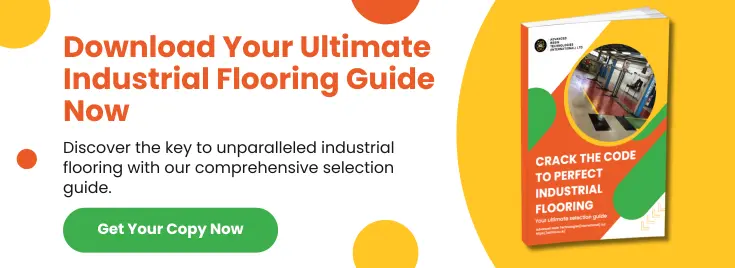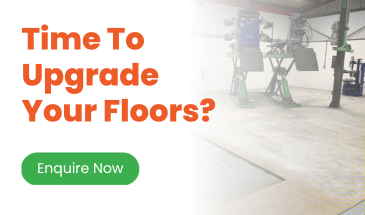A resin flooring system can significantly improve the durability, functionality, and safety of your warehouse facility floor, strengthening performance and reducing risk. In this article, we’ll look at four different types of resin screeds with the potential to transform your warehouse floor into a high-performance surface built to withstand the toughest environments. For each floor type, we examine the benefits, drawbacks, and ideal applications to help you make an informed choice.
1. Anti-Static Floor Screeds
Anti-static floor screeds are a good choice for businesses looking to prevent static buildup from damaging sensitive electronic components and sparking fires or explosions.
Ideal For: Warehouses with high levels of static electricity.
Advantages
- Safety: Anti-static floor screeds dissipate static electricity, reducing the risk of accidents and damage arising from electrostatic discharge (ESD). This is ideal for warehouses that store electronic components or inflammable substances!
- Durability: The robust nature of anti-static screed flooring provides a long-lasting and tough surface for heavy traffic, warehouse machinery, and the regular loading and unloading of products.
Disadvantages
- Price: Anti-static screeds can be more expensive than standard resin screeds due to the additional components and additives required for effective static control.
- Design Limitations: There are often fewer design customisation options available for anti-static flooring when compared to other resin screeds.
2. Epoxy Floor Screed
Commercial epoxy resin floor screed is well-suited for a variety of warehouse applications due to its long-term durability and tolerance of cleaning chemicals, as well as its hard resistance to wear and tear.
Ideal For: General purpose warehouses and distribution centres that need a tough and reliable flooring solution with broad chemical resistances and resistance to abrasions, impact damage, and foot and vehicle traffic.
Advantages:
- Applications: Epoxy resin floor systems can be laid in almost any warehouse – due to its versatile properties, low maintenance needs, and its modest price point.
- Load Resistance: Industrial-grade epoxy screeds are designed to withstand a range of heavy load activities, including forklift traffic, storage units, and industrial plants such as processing equipment, conveyor belts, etc.
- Appearance: An epoxy screed flooring can be tailored to meet a variety of design requirements and colour specifications, creating an attractive and professionally-branded environment for customer-facing warehouses.
Disadvantages:
- Slip Hazard: Untreated epoxy resin floors can be extremely slippery when wet, presenting a slip hazard to workers and vehicles. This disadvantage can be overcome or mitigated through the application of nonslip additives to walkways and other key areas.
- Installation Time: The curing process for a large-scale epoxy flooring system can be lengthy, so downtime could be an installation factor for busy warehouses.
3. Polymer Screed
Polymer screed floors are similar to the traditional cement flooring frequently found in warehouses but with the addition of a polymer additive to enhance drying time and strengthen the floor base. This increases durability, load-bearing strength, lifespan, and range of applications.
Ideal For: Warehouses that need a flexible and robust flooring solution on a tight budget, or don’t have the requirement for a pure resin screed. Polymer screeds are also used in commercial warehouses where strength and fast drying are important in order to minimise downtime.
Advantages:
- Value: Polymer screeds are a more affordable option than many resin-based flooring systems, providing a blend of cement and polymer bonding agents to deliver a high-value solution without compromising quality or safety.
- Versatility: The polymer additives increase the flexibility and versatility of the flooring system, decrease the risk of shrinkage, and provide excellent adhesion to the subbase, making it suitable for warehouses with high-temperature fluctuations (e.g., cold storage or freezer facilities) or that house heavy machinery.
- Drainage: Unlike pure epoxy resin screeds, polymer screeds can be installed on a slope so that, for instance, the floor can be laid to fall towards a drainage system in which process water and waste can naturally flow, creating a more hygienic environment and preventing the formation of water puddles.
Disadvantages:
- Cost: Although generally cheaper than other types of resin flooring systems, polymer-modified screed can be expensive compared to a traditional concrete or cement warehouse floor.
- Complex Installation Process: The quality of a polymer screed depends greatly on the quality of the sand and the type of additives incorporated into the mix, as well as its depth and the quality of its bonding agent. If the right ratio is not maintained during the mixing process, issues can arise post-installation, so it is essential to use an experienced resin flooring contractor with knowledge of installing polymer screeds in warehouses similar to your own.
4. Polyurethane Screed
Polyurethane screeds are heavy-duty flooring systems that are mixed with aggregates to provide an almost impervious, chemical, and abrasion-resistant surface for high-performance warehouses. Our polyurethane screeds provide the highest level of durability and are classified by FeRFA as Type 8, making them the most hard-wearing and robust warehouse screeds on the market.
Ideal For: High-performance warehouses in the food and drinks industry, heavy industry, and the manufacturing sector.
Advantages:
- Toughness: Polyurethane screeds are quite simply the toughest and most hard-wearing resin floors available, capable of withstanding high loads, wheeled traffic, and substantial abrasions and impacts.
- Hygiene: Polyurethane screeds are straightforward and easy to steam clean, producing a hygienic floor suitable for food and beverage and pharmaceutical applications.
- Easy Installation: Polyurethane screeds have a low viscosity compared to epoxy screeds, and some can be applied by hand trowel if necessary, creating a robust anti-skid surface. Self-smoothing, medium-duty polyurethane flooring systems are also available, which use fine aggregates to deliver a smoother finish.
Disadvantages:
- Expensive: The superior qualities of polyurethane screed come with a higher price tag, in many cases, than other resin floor systems, and specialist additives and qualities, such as UV-resistant versions, can further increase the price.
- Maintenance Difficulties: A high-quality polyurethane floor is almost impervious to anything you throw at it, but despite its strength and durability, it can sustain damage under certain conditions. Any damage may be difficult to rectify without sanding back the surface and recoating, which increases the cost and inconvenience of repairs.
Contact Us
For advice on choosing the best flooring system for your warehouse application, please contact one of the experts at Advanced Resin Technologies (International) today.




